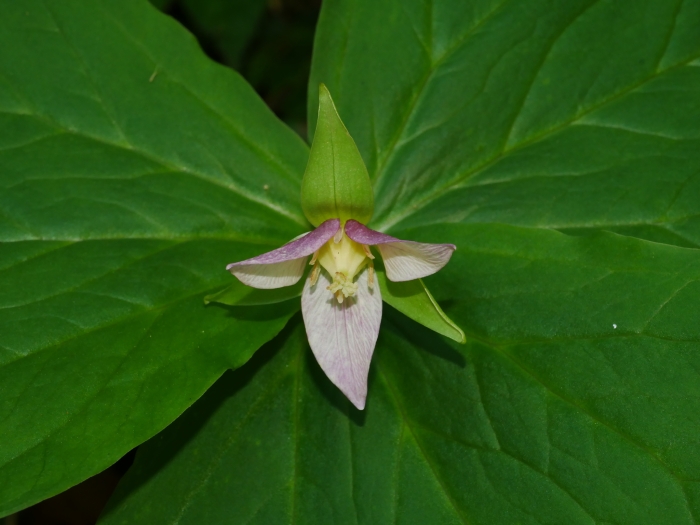Tschonoski’s Trillium
(Trillium tschonoskii)
Tschonoski’s Trillium (Trillium tschonoskii)
/
/

Jacy Chen
CC BY 4.0
Image By:
Jacy Chen
Recorded By:
Copyright:
CC BY 4.0
Copyright Notice:
Photo by: Jacy Chen | License Type: CC BY 4.0 | License URL: http://creativecommons.org/licenses/by/4.0/ | Rights Holder: Jacy Chen | Publisher: iNaturalist | Date Created: 2022-04-28T10:53:46-07:00 |




















Estimated Native Range
Summary
Trillium tschonoskii, commonly known as Tschonoski’s Trillium or Mountain Woods Trillium, is a perennial herb that is deciduous in nature. It is native to the understory of temperate forests and woodland areas in Eastern Asia, specifically in Japan, Korea, and China. This species typically grows to a modest height of 0.5-1 feet (0.15-0.3 meters) and features a solitary, erect stem. The plant is notable for its triad of large, ovate leaves and its solitary, white or greenish-white flowers that bloom in the spring. The flowers are quite showy, with three large petals and three smaller sepals, and they are often found perched above the foliage, giving the impression of a "pearl on a head."
Tschonoski’s Trillium is valued for its delicate, ornamental flowers and its ability to thrive in shaded conditions, making it an excellent choice for woodland gardens, shade gardens, and naturalized areas. It is also appreciated for its low maintenance requirements once established. Gardeners should provide it with part shade to full shade, medium moisture, and well-drained loam or clay soils with rich organic matter to mimic its natural forest floor habitat. While it is slow-growing, it can form attractive clumps over time. It is not known for any significant pest or disease problems, but it can be sensitive to excessive sunlight and dry conditions.CC BY-SA 4.0
Tschonoski’s Trillium is valued for its delicate, ornamental flowers and its ability to thrive in shaded conditions, making it an excellent choice for woodland gardens, shade gardens, and naturalized areas. It is also appreciated for its low maintenance requirements once established. Gardeners should provide it with part shade to full shade, medium moisture, and well-drained loam or clay soils with rich organic matter to mimic its natural forest floor habitat. While it is slow-growing, it can form attractive clumps over time. It is not known for any significant pest or disease problems, but it can be sensitive to excessive sunlight and dry conditions.CC BY-SA 4.0
Plant Description
- Plant Type: Herb
- Height: 0.5-1 feet
- Width: 0.5-1 feet
- Growth Rate: Slow
- Flower Color: White, Green
- Flowering Season: Spring
- Leaf Retention: Deciduous
Growth Requirements
- Sun: Part Shade, Full Shade
- Water: Medium
- Drainage: Medium
Common Uses
Bee Garden, Bird Garden, Border Plant, Butterfly Garden, Hummingbird Garden, Low Maintenance, Potted Plant
Natural Habitat
Native to the understory of temperate forests and woodland areas in Eastern Asia
Other Names
Common Names: Tschonoski’s Trillium, Mountain Woods Trillium, Tschonosk Trillium, Tschonoskii’S Wakerobin
Scientific Names: , Trillium tschonoskii, Trillium camschatcense subsp. tschonoskii, Trillium camschatcense var. tschonoskii, Trillium morii, Trillium tschonoskii f. cryptopetalum, Trillium tschonoskii f. morii, Trillium tschonoskii f. violaceum, Trillium tschonoskii subsp. atrorubens, Trillium tschonoskii subsp. cryptopetalum
GBIF Accepted Name: